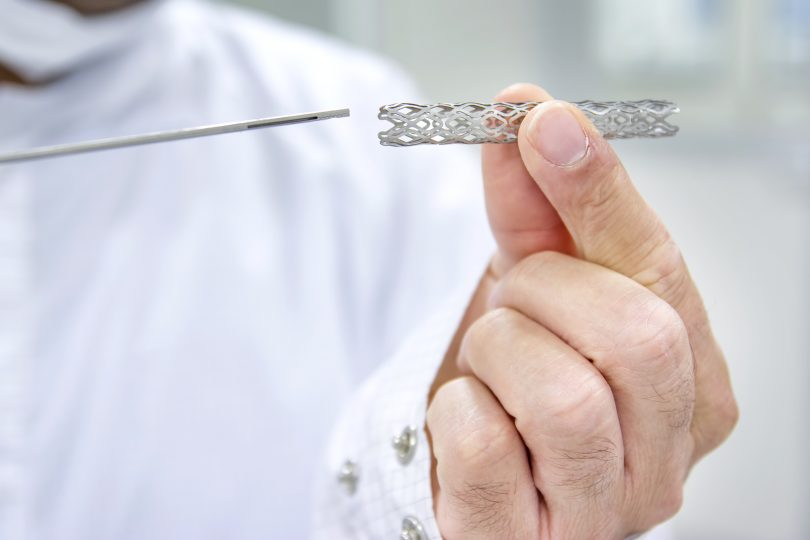If you have a heart condition, cardiac catheterization may be in your future.
But what exactly is it?
“Cardiac catheterization is a broad term that covers a variety of different procedures in the cardiac catheterization lab. It is used to diagnose and treat heart problems,” said Dr. Vishal Arora, an interventional cardiologist at Augusta University Health’s Cardiovascular Center.
“One of the major things we do is coronary angiography, where we look for and clear blockages in the arteries,” he added. “But we can also use cardiac catheterization to check pressures in the heart chambers, assess the valves and check the strength of the heart’s pumping action.”
Are you scheduled for a cardiac catheterization procedure? Here are some of the most common questions asked by our patients:
What really happens during cardiac catheterization?
Your doctor will use a needle and a guide wire to place a sheath, or thin tube, into a blood vessel in your wrist or groin. He or she will then insert a catheter—a long, thin tube—into the sheath and thread it to your heart using X-ray for guidance.
Your doctor may also inject a special dye called contrast to look for blockages. If the blockage is suitable for treatment, balloon angioplasty or stent placement can be performed as part of the same procedure.
Why do I need it?
You may need cardiac catheterization if you go to the emergency room or visit your doctor with symptoms like:
- Chest pain
- Shortness of breath
- Fatigue
- Not being able to exercise or do daily activities at the level you were before
- Pain somewhere else, such as the arm or jaw
Depending on your symptoms, your doctor may say you need a cardiac catheterization the same day or the following day or may want you to do a stress test or other screening first.
What if I’m having a heart attack?
If you’re having a heart attack caused by a blockage, once you get to the ER, you will most likely go to the cardiac catheterization lab right away so that the team—which is on call 24/7—can immediately clear the blockage. National guidelines from the American Heart Association recommend that a blocked artery causing a heart attack to be reopened within 90 minutes of a patient entering the ER doors.
Time is precious because when an artery is blocked, the heart can’t get blood, so heart muscle can die. “At Augusta University Health, we are very successful,” said Arora. “In fact, many of our patients have arteries reopened in 60 minutes.”
Can I eat or drink before the procedure?
You won’t be able to eat or drink for at least six hours prior to your procedure. If you’re on diuretics, your doctor may ask you to stop for a while since diuretics combined with not drinking can lead to dehydration and even cause kidney complications. Metformin and other anti-diabetic medicines can create problems with the contrast dye, so your doctor may ask you to hold off on those too for a short time.
Will I be under general anesthesia?
You’ll actually get a pain killer and a sedative that will place you in “twilight sleep.” You likely won’t remember much about what happens, but your doctor will be able to ask you questions. A nurse will also be right next to you throughout the procedure to make sure you’re comfortable.
What will happen on the day of?
On the day of your procedure, you’ll be checked in, fill out paperwork and will get at least one IV.
Your doctor will do your cardiac catheterization either through the wrist or the groin. Going through the wrist usually means faster recovery, but your doctor may need to go through the groin because of anatomy issues or if a larger catheter needs to be used. Your team will prep both areas just in case.
During the actual cardiac catheterization, your doctor will confirm the problem—and typically will fix it too. But in some cases, the problem is more complex, or you might need surgery instead. That could mean scheduling another procedure down the road.
Will I need to stay in the hospital overnight?
While all cardiac catheterization labs are located inside hospitals, there have been so many advancements in the procedure that most patients go home the same day.
If your doctor entered through your wrist, you’ll need to rest for two hours with a tight band on your wrist. Then you can go home.
If it was through your groin, your doctor may use a plug or a suture to close the artery. You’ll rest for a couple of hours before heading home. Or, if a plug or suture cannot be used, you’ll have pressure applied to the artery and you’ll need to rest for up to six hours to give the blood vessel time to heal.
Once you’re home, doctors usually tell patients not to lift any heavy objects for at least a couple of days and not to drive. It’s also a good idea to drink plenty of water to help you get hydrated again.
How soon will I feel better?
“If you’re having a heart attack, the effects of opening the coronary artery are immediate,” said Arora. “But once most patients go home, start exercising or doing their daily activities, they should see an improvement in symptoms.”
Changing your lifestyle to help fix the underlying problem with your heart is important to keep you healthy and out of the hospital. So your doctor may prescribe medicines like aspirin or Plavix, blood pressure-lowering medications, cholesterol-lowering medications, and also prescribe a cardiac rehabilitation program so that you can exercise and help your heart grow stronger.
“A cardiac catheterization isn’t a quick fix,” said Arora. “It’s still a major procedure. But it’s minimally invasive, and our devices and equipment are getting better all the time. Because of that, we can do procedures through these very tiny holes that used to have to be done with an open procedure. As a result, patients now have more comfort, less pain and fewer complications.”





